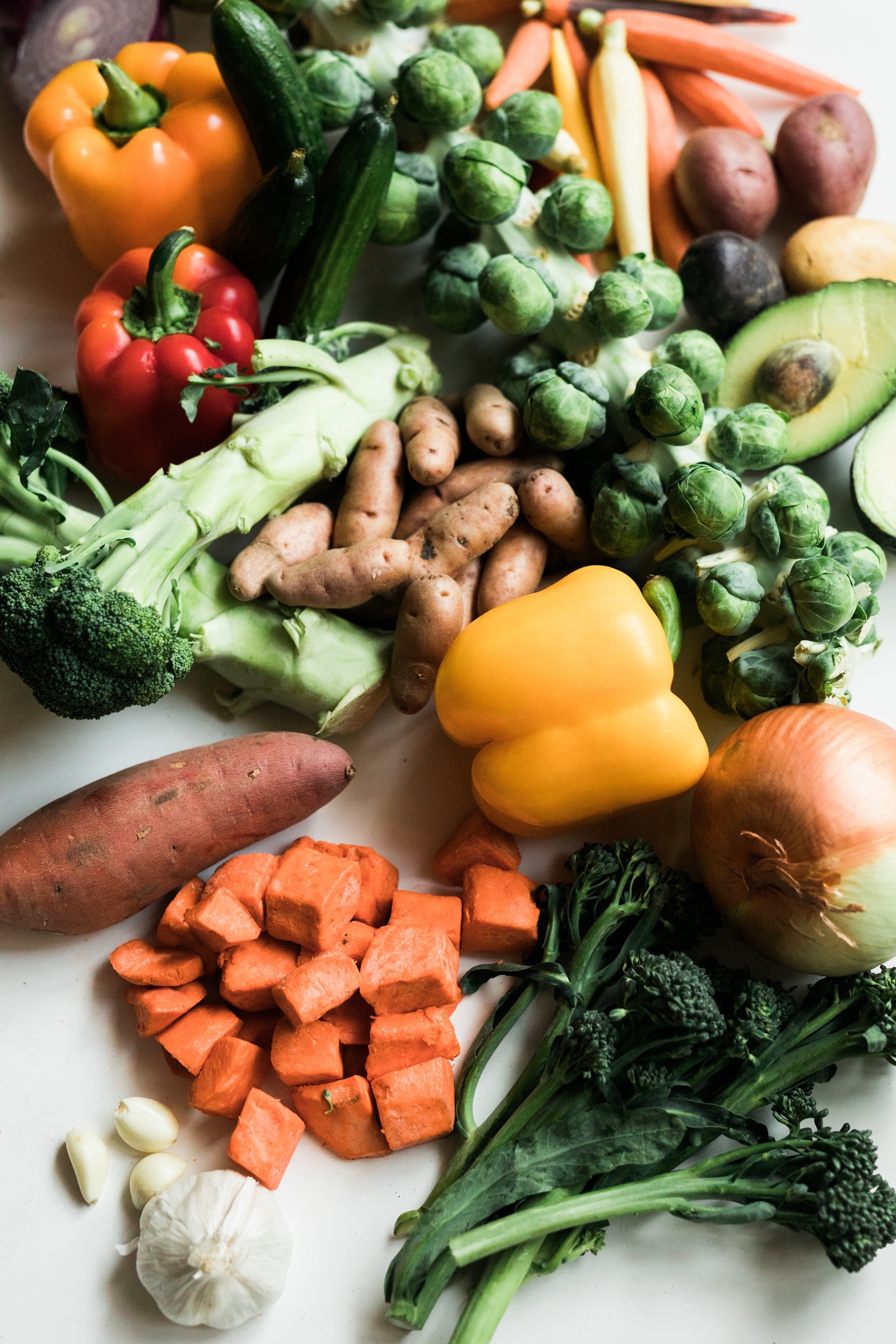

Knowledge
How to manage PCOS symptoms through your diet
Polycystic ovary syndrome (PCOS) affects up to 15% of women in their reproductive years across the globe and can cause a number of symptoms like excess hair growth or loss, acne, weight gain, and irregular periods. Because of how the condition affects menstruation and ovulation, it’s the most common cause of female fertility. It can be scary to be diagnosed with PCOS, but we have some good news: several scientific studies have found that PCOS symptoms improve when you eat the right foods. Diet can also boost your fertility. Keep reading this article to find out what foods you should eat and what you should avoid to help you manage PCOS symptoms.
The link between PCOS and weight
PCOS can make it more challenging for your body to convert sugar and starch from foods into energy. This is called insulin resistance and can increase the body’s blood sugar levels, leading to weight gain. Insulin resistance can lead to obesity, high cholesterol, and type 2 diabetes. Research from 2019 found that between 33 and 83% of women with PCOS are overweight or obese.
Having excess weight can worsen the symptoms of PCOS, making it turn into a vicious cycle. PCOS symptoms are highly sensitive to the body’s insulin levels, the amount of deep-seated adipose tissue, systemic inflammation, and hormonal balance. Women with PCOS tend to have more deep-seated adipose tissue, which is important because this is also an endocrine organ that secretes hormones. When you have more adipose tissue, more hormones get released, further upsetting the hormonal balance.
This leads to chronic inflammation in the body and further weight gain, which at the same time increases insulin resistance. Having a higher resistance to the hormone insulin disrupts blood sugar levels and increases blood pressure, further negatively affecting PCOS symptoms.
Because of this, women with PCOS are recommended to make various lifestyle changes in attempts to reduce the amount of deep-seated adipose tissue, inhibit inflammatory processes and regulate blood sugar levels. This will not only help prevent obesity and insulin resistance, but also improve ovarian health and therefore fertility.
How can proper nutrition minimize PCOS symptoms?
Having a balanced diet is one important way that you can improve your PCOS symptoms, fertility, and overall quality of life.
If you are overweight or obese, it’s especially important to make key lifestyle changes through diet and exercise to lessen PCOS symptoms. The good news is that doctors have found that losing just 5 to 10% of body weight can help regulate your menstrual cycle and relieve symptoms like metabolism and male pattern hair growth.
Foods to help with PCOS
The first priority should be to minimize your intake of processed sugars and saturated fats. These only increase your blood sugar levels unnecessarily and support the build-up of fatty tissue.
Here are the foods you should add to your diet:
Complex carbohydrates / fiber and unsaturated fats: These foods can improve your metabolism by promoting the growth of healthy gut bacteria which helps with digestion. Our brain also gets important signals from these foods, like when we are full, and they can help regulate blood sugar levels.
Vitamins, minerals and antioxidants: Vitamin D helps minimize PCOS symptoms, improve reproductive organ function, and regulate glucose and fatty acid metabolism. In addition, the vitaminoid inositol improves insulin resistance and cardiovascular disorders, which is why it is often used as a therapeutic agent in PCOS.
Vegetables, fruits, grains, nuts, plant seeds, grapes, berries, red wine and olive oil: The plant polyphenols in these foods have been found to relieve PCOS symptoms.
Turmeric: Antioxidants from turmeric have a fundamental anti-inflammatory effect and alleviate PCOS symptoms.
Herbal teas: Teas made from aloe vera, cinnamon, chamomile and green teas are also recommended for women with PCOS as they regulate blood sugar levels and counteract insulin resistance.
Flaxseed and black cumin: Lignan is an ingredient found in these foods which stabilizes estrogen synthesis and thus relieves PCOS symptoms.
What diets are recommended for women with PCOS?
Several studies have looked into which diet helps the most for PCOS, but haven’t found a clear answer yet. A variety of diets have proven to be beneficial.
The ketogenic diet, which is high in fat and low in carbohydrates, alleviates many PCOS symptoms. It also helps to regulate hormonal balance and blood pressure in the short term, as well as reduce the risk of type 2 diabetes and obesity. However, the ketogenic diet is not recommended over the long term as it can lead to systemic glucose intolerance.
On the other hand, the Mediterranean diet is generally considered quite healthy. It includes large amounts of unsaturated fatty acids, fiber, antioxidants and vitamins and only small amounts of animal proteins. Studies have also shown that the plant polyphenols in the Mediterranean diet protect against obesity, cardiovascular disease and type 2 diabetes, and promote ovarian health.
Furthermore, diets that lower blood pressure, are based on a low glycemic index, or are rich in legumes also help. These all have similar positive effects on the symptoms of PCOS.
In the end, it’s totally up to you if you want to stick to a certain diet or simply add more of the recommended foods to your daily meals. But the bottom line is that you should consume plenty of fiber, antioxidants, vitamins and minerals to minimize PCOS symptoms.
A healthy, balanced diet has a lot of the following foods:
- fruits and vegetables
- whole grains
- seeds, nuts, and vegetable oils
- legumes and vegetable proteins
And little to none of the following foods:
- (low-fat) dairy products
- animal proteins and processed meat
- sweets
Learn more about this hormonal condition and what to do about it in our PCOS factsheet. If you haven’t been diagnosed with PCOS but think you may have it, or want to know what else you can do to improve your chances of conceiving a baby, test your fertility with LEVY. We will give you a personalized action plan to help you along your journey to parenthood.
Sources
Barrea et al: PCOS and nutritional approaches: Differences between lean and obese phenotype. 2021. Metabolism Open. doi: 10.1016/j.metop.2021.100123
Szczuko et al: Nutrition Strategy and Life Style in Polycystic Ovary Syndrome—Narrative Review. 2021. Nutrients. doi: 10.3390/nu13072452
Che et al. Dietary Interventions: A Promising Treatment for Polycystic Ovary Syndrome. 2021. Annals of Nutrition and Metabolism. doi: 10.1159/000519302
Rizk and Thackry. Intersection of Polycystic Ovary Syndrome and the Gut Microbiome. 2021. Journal of the Endocrine Society. doi: 10.1210/jendso/bvaa177
Barber T et al.: Obesity and Polycystic Ovary Syndrome: Implications for Pathogenesis and Novel Management Strategies. Clin Med Insights Reprod Health. 2019;13:1179558119874042.
Can PCOS Cause Weight Gain? Cleveland Clinic. Accessed 08 June 2022.
You might also like...

Female hormones: What you need to know about reproductive hormones, the menstrual cycle, and fertility
When you’re struggling with fertility, one of the first places to look is your hormones. Certain vital reproductive hormones are in charge...
Silvia Hecher
January 17, 2024

Fertility blood test: Why does it need to be cycle days 2-5?
When you test your fertility with LEVY, you will always check your basic reproductive hormone levels (including FSH, LH, TSH, Prolactin, Estradiol,...
Lena
September 8, 2022

Forms of amenorrhea and fertility
Not getting your period is a condition called amenorrhea. It’s important for fertility because not having a menstrual cycle with monthly ovulation...
Lena
January 18, 2022

6 Interesting Facts About Ovaries You Might Not Know
Women have two ovaries which are located on either side of the uterus. They’re around 3-5 cm long – about the size...
Kayla
April 20, 2022

What to expect when testing your fertility with LEVY
If you’ve been trying to conceive for a while, it’s totally normal to feel frustrated. Why hasn’t it happened for you yet,...
Kayla
February 3, 2022

Your Complete Guide to Birth Control Options and Fertility
If you’ve been using birth control for a while, you may be wondering how it can impact your fertility now that you...
Kayla
February 21, 2022

Fertility Foods for Women to Help You Get Pregnant Faster
How you nourish your body is key not only when you have a baby in your belly, but also to help prepare...
Kayla
March 22, 2022

What your AMH levels can tell you about fertility
FSH, LH, estrogen, progesterone… If you’re struggling to have a baby, you’re probably becoming an expert on all things hormones. AMH is...
Lena
August 25, 2022

Why Vitamin D matters for fertility
Vitamin D is a very important nutrient to keep our bodies healthy and working as they should. But did you know that...
Kayla
January 18, 2022




